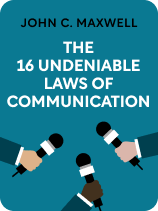

This article is an excerpt from the Shortform book guide to "The 16 Undeniable Laws of Communication" by John C. Maxwell. Shortform has the world's best summaries and analyses of books you should be reading.
Like this article? Sign up for a free trial here.
Do you have a speaking engagement coming up? Are you nervous about it? Are you not sure you can make an impact?
John C. Maxwell estimates that he’s spoken over 13,000 times throughout his career. He’s well-positioned to help you learn how to speak more confidently. In his book The 16 Undeniable Laws of Communication, he shares encouragement and tips for easing your mind and coming across assuredly.
Continue reading to learn how to believe in yourself and your audience when you speak.
How to Speak More Confidently
According to Maxwell, your mindset, energy, and feelings affect how your audience receives you and your message. The more you believe in yourself and your speaking ability, the more your audience will. Maxwell provides his advice on how to speak more confidently and powerfully, encouraging you to adopt two beliefs.
1. Believe in your ability to communicate. Your self-confidence affects how you perform in front of an audience. If you show that you’re nervous, your audience will be more concerned about you than your message. Maxwell suggests you start small and develop a short affirming statement to remind yourself that you’re able to communicate well and make a difference with your words.
(Shortform note: If public speaking makes you nervous, it can be hard to feel confident by stating affirming statements alone. In The Charisma Myth, Olivia Fox Cabane suggests you practice visualization and powerful body language to change your mental state and make you feel more confident. When you feel anxious, imagine that you’re being hugged. This releases chemicals in your brain that help calm your nerves. To feel more confident, stand tall and puff out your chest. As this posture becomes a habit, you’ll naturally feel more confident.)
2. Believe you can help your audience. When you believe your message can positively impact people’s lives, your audience will sense your passion and become more excited about your ideas. Maxwell also suggests believing that your audience wants to learn from you. If you approach your speech with the mindset that people are eager to listen, your words will be more encouraging. On the other hand, if you doubt anyone’s interested in what you have to say, your words may lack conviction and be less persuasive.
(Shortform note: In Talk Like TED, Carmine Gallo offers some evidence that may help you believe that your audience truly is eager to learn from you and that your message will have a positive impact on them: The human brain is wired to love learning. When we learn new things, our brains release a chemical that makes us feel good. When you present information to your audience, they’ll associate their positive feelings with you and be more engaged as you speak.)

———End of Preview———
Like what you just read? Read the rest of the world's best book summary and analysis of John C. Maxwell's "The 16 Undeniable Laws of Communication" at Shortform.
Here's what you'll find in our full The 16 Undeniable Laws of Communication summary:
- The secrets to becoming a confident and effective communicator
- How anyone can master public speaking, no matter how nervous they get
- How to write a clear and engaging speech






